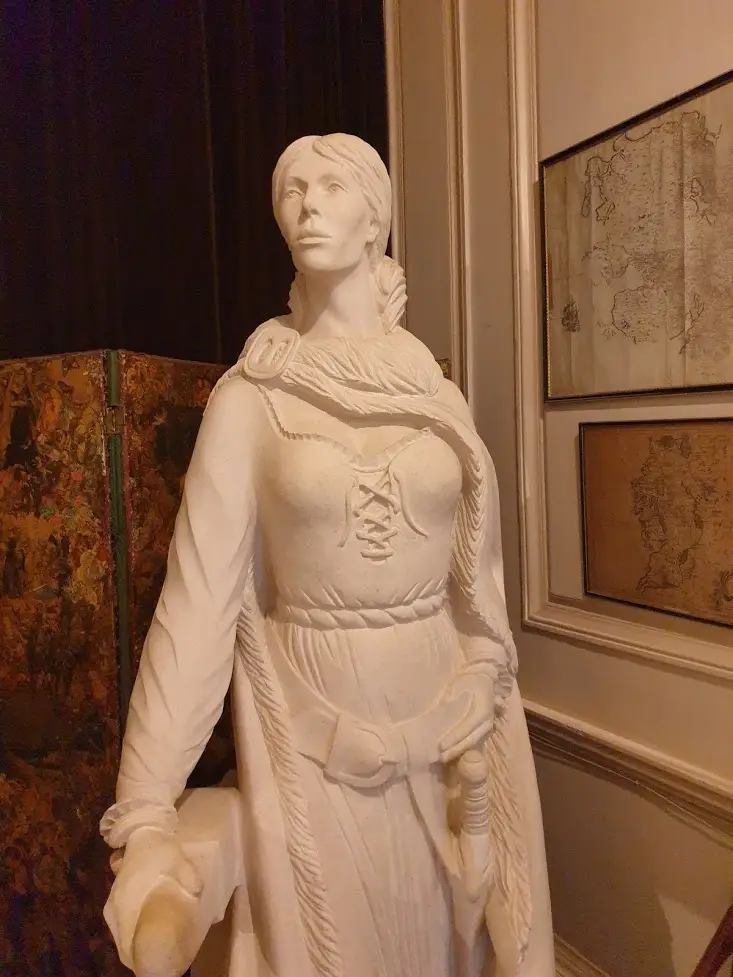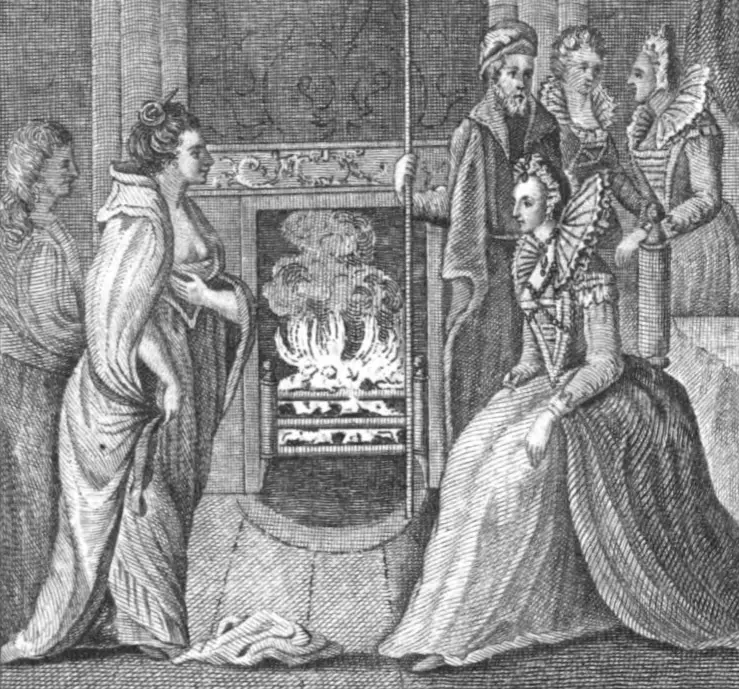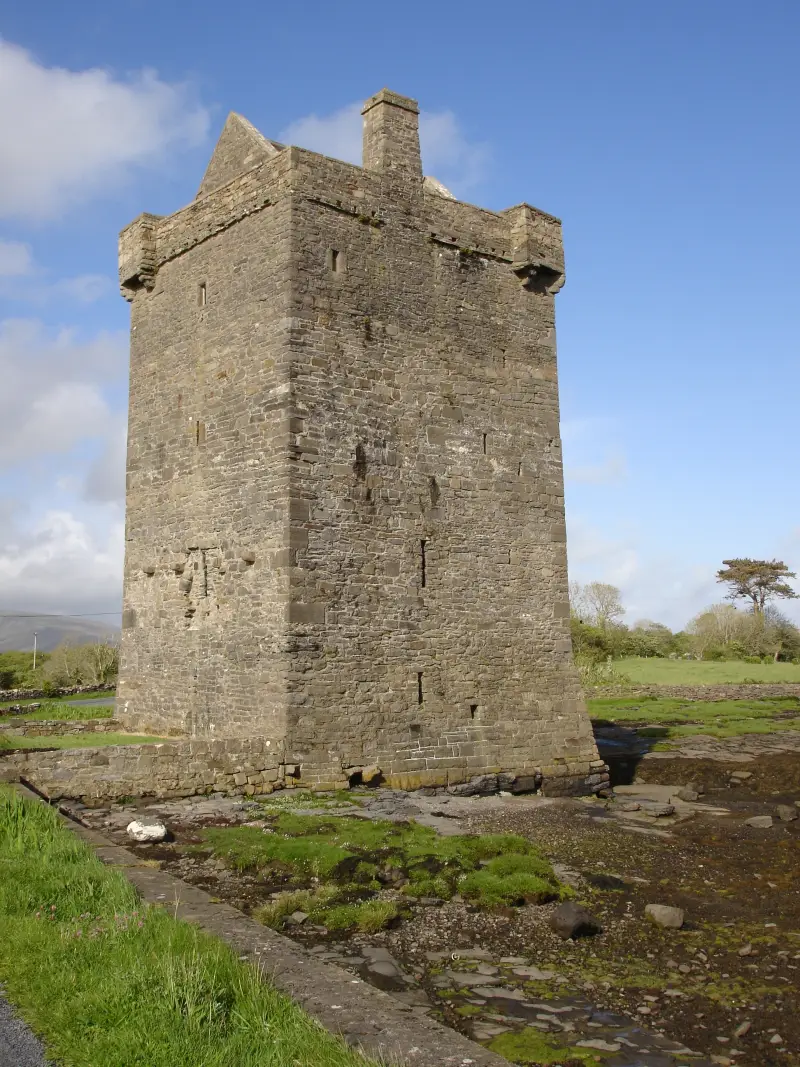Grace O'Malley is one of the most famous Irish women

Among the people, O'Malley became a heroine, but the official story Ireland calls her a robber and rebel. Grace became famous primarily for her victories at sea and for organizing resistance to the expansion of Elizabeth I in Irish lands.
The O'Malley clan and Grace's early years
We know the early life of our heroine from folklore, since official history does not like to talk about this woman.
So, the O'Malley clan was one of the most powerful and was engaged in navigation in the west of Ireland. For several centuries, Grace's ancestors dominated the waters of Mayo, Umhalla. The clan's coat of arms bore the motto Terra Marique Putens, which translates from Latin as “Valiant on sea and land.” The clan traded with France and Spain and collected taxes from ships that fished in its territory.
The O'Malley family is sometimes called pirates. But they were not classic pirates. They collected duties from ships in their waters; if they refused to pay the money in an amicable manner, they used force.

In 1457, Grace's ancestors founded Murrisk Abbey, which became their ancestral seat. Our heroine's father, Owen O'Malley, or in the Irish manner, Eoghan Dubhdara O'Malley, was a lord. It is also known that Grace had an older half-brother.
Granual herself, as she is also called, was born around 1530. She gravitated towards the sea, she wanted to command ships, like her father. But she was a girl. Although women's rights in Ireland were little better than in the rest of Europe at the time, no one would have thought of giving command to a woman.
But the girl was stubborn from an early age. As a child, according to one version, she cut her hair short, and according to another, bald, in order to pass for a boy and get on the ship. Perhaps this is where her nickname “bald Grace” came from.
At 16, Grace married Donal O'Flaherty and bore him three children: Owen, Margaret and Murrow. The family lived in Bunoven Castle. But the happiness did not last long - when the girl was 23 years old, her husband was killed by the Joyce clan in an ambush during a hunt.
When Elizabeth I ascended the throne, she continued her policy of expansion of Irish lands. Irish lords were required to swear allegiance to the crown. But it turned out not to be so simple, and the queen faced uprisings and division. One of those who resisted was Donal. At first he defended his castle, then Grace began to defend the estate and repelled the attackers so fiercely that the fortress received the nickname “Rooster”.
Piracy and second marriage
Although the laws of Ireland at that time were favorable to women, and Grace at the age of 23 was a fairly famous person, Donal's castle passed to his cousin. The girl with three children and most of her late husband's warriors, who were imbued with her courage, returned to the family castle on the Isle of Clare. It was this castle that became her base in future maritime affairs. Under Grace's leadership at that time there were about 200 soldiers from different clans, three galleys and several small boats.
O'Malley's ships traded with others, collecting tribute from those who fished in her territory. Grace proved herself to be excellent in those years, and they began to call her the “Queen of the Pirates.” O'Malley's team robbed ships near Scotland and raided Scottish settlements.
There is a legend that Grace saved a sailor during a raid and they became lovers. But the sailor was killed by the people of the McMahon clan. Our heroine tracked down and destroyed them at sea, then reached their fortress MacMahon in Duna Castle. After which she received another nickname “Dark Lady Duna”. And they began to respect the woman even more.
I found another legend. Ireland of those times lived according to certain traditions. And the owner of the house was obliged to provide free shelter and food to those who came to visit him. Grace, shopping in the port of Howth near Dublin, wanted to relax in a local castle, but its owner, the Count, refused her and asked her not to distract her from dinner. Grace, enraged, kidnapped his grandson and brought him to her castle. She gave the boy away only after his grandfather promised to leave the doors of his castle open for everyone in need and to set an extra place for a possible guest at every meal. Although, most likely, the main motive for the kidnapping was money that the rich grandfather could give in exchange for his grandson.
In 1567 O'Malley married Richard Bourke the Iron. He was the owner of a metallurgical plant, which is why he got his nickname. The girl had already chosen her husband on her own initiative. It is difficult to say whether there was love on her part. The couple entered into a “trial marriage”. A fairly common phenomenon of those times in Ireland, when a husband and wife married for 1 year, and after that they could easily separate or enter into a real marriage. Historians call this a marriage of convenience, since Richard was rich and inherited the lands of the MacWilliam clan. These are vast territories on the coast of Ireland where Grace could develop her maritime business.
But be that as it may, a few months later Richard returns from sailing, and the key does not fit the door. The wife changed all the locks and said that they no longer live together. I don’t know whether this story is true or not, but they remained husband and wife until the end of Richard’s death - about 15 more years.
The couple had a son, Tibbott, nicknamed “Toby of the Ship,” as Grace gave birth to him on board the ship. According to legend, the next day, when she was with her newborn in the hold, their ship was attacked by Algerian pirates. And things went badly until she left her one-day-old son and went out to fight off the attackers herself.
Queen, Bingham and death
Grace and Richard experienced serious attacks from the English crown. Elizabeth sent her men who bribed Irish landowners in exchange for help in the war against other clans who opposed the crown.
The Earl of Desmond decided to promote Elizabeth's exploits in Ireland. In the Limerick area, he caught Grace, who at that moment was robbing coastal places. The woman was imprisoned there, then transferred to Dublin, where noble prisoners were kept. Few came out from there, but Grace was lucky, and in 1579, after just a year, she was released. Perhaps the prisoner's good behavior played a role.
In 1981, Richard received the title of MacWilliam and became the most powerful lord among the Irish. However, two years later Grace's second husband died.
Richard Bingham, an ardent supporter of the ideas of Queen Elizabeth I, took on O’Malley. If the Irish still lived according to tradition, when the entire territory was divided into clans, and they were ruled by a lord, then the English crown began to break these traditions. And Bingham began actively persecuting the Irish lords against each other. In 1585, Richard Bingham unveiled his plan for the "Composition of Connacht". Now the lords could not recruit mercenaries and be independent military leaders. Also, farmers now paid rent to them, and they paid taxes to the British.
Not all lords agreed with this course of affairs, and among them was Grace. She resisted, Bingham took revenge on her, killed Owen's son from his first marriage and captured the other two - Tibbott, Murrow and his half-brother. Afterwards, Grace herself was arrested, but she escaped with the help of her son-in-law.
The woman returned to her castle, but it no longer belonged to her. In those years, the Spaniards actively fought with the British and were based on the west coast of Ireland. The woman had nowhere else to live. Grace did not want to cooperate with Bingham, who did this to her family. O'Malley had no choice but to go to the queen herself.
Before meeting Elizabeth, Grace had to fill out a written form with 18 questions. When the two women met, O'Malley did not bow to Elizabeth. She also considered herself a queen, and not a subject of the English crown. Although this seems like a fairy tale, because Grace came to ask for help, and this was clearly not the moment when she needed to show her pride. There they also found a dagger on Grace, which she allegedly left for self-defense.
But Elizabeth allowed him to leave, and further conversation between the two great women of the British Isles took place in a calm atmosphere in Latin. The Queen of England promised to release all Grace's relatives and leave this family alone, and O'Malley promised to provide the crown with 200 soldiers and her fleet to maintain peace in Ireland.

Bingham was offended that Grace jumped over him and went straight to the queen. And he was in no particular hurry to carry out the royal decree. As it turned out, he was right, because Grace gave the ships not to the British, but to the rebels of Hugh O’Neill, who began the war for the liberation of Ireland in 1593. But at the same time, according to some articles that I have read, later Irish historians claim that Grace persuaded Tibbot's son to fight for Elizabeth. This is such a paradox.
Little is known about the last years of O'Malley's life. In 1595, she submitted a petition to the British against their troops being based on her lands and ruining them. She died of natural causes in 1603, the same year as Elizabeth I, at her Rockfleet Castle. Grace was buried in the abbey on Clare Island.

If you look at the opinions of Irish historians, most scientists are inclined to believe that Grace defended her own and family interests, and did not fight for the freedom of the Irish people. Yes, perhaps she did not personally participate in the uprising, but she never provided any assistance to the crown, silently taking the side of the rebels and supplying them with ships.
Information